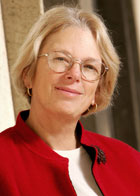
By Andrew Cohen
When she launched the Copyright Principles Project (CPP) in 2007, Berkeley Law Professor Pamela Samuelson knew that her goal—achieving meaningful consensus among an array of stakeholders to advance copyright law reform—was daunting. But when she testified last month before the U.S. House Judiciary Subcommittee on Courts, Intellectual Property and the Internet, the impact of her efforts became clear.
With the support of then-U.S. Register of Copyrights Marybeth Peters, Samuelson assembled 20 copyright experts—legal academics, private practitioners, and corporate lawyers—to take part in the CPP’s three-year project. In 2010, the group issued a major report recommending 25 substantive reforms to improve and update copyright law in an era of rapid technological change.
At the May 16 hearing, Samuelson and four CPP colleagues testified on balancing the interests of copyright owners and users (see Samuelson’s testimony here, and a video of the full hearing here). Subcommittee members praised their diligent work and inclusive approach.
Rep. Mel Watt (D-NC) said the report contains “useful background and insight” into how parties with varying views can “engage in a constructive and respectful dialogue. I’m particularly intrigued by the recommendation to strengthen the exclusive right of copyright holders to control communications of their works to the public,” he said, “which I believe more closely aligns with the principle that aims to preserve and protect creators’ rights.”
The copyright law hearing marked the first of many expected over the next two years. The 1976 Copyright Act is widely considered outdated in the face of challenges posed by advances in technology, new business models, and novel uses of protected works.
Samuelson testified that continual amendments over the past 37 years has made U.S. copyright law “more like a patchwork quilt than a coherently woven fabric” for today’s diverse creative environment. She also said the Act’s length and complexity “obscured the normative foundations of the law, which are so important to engendering public support and respect.”
Rep. Bob Goodlatte (R-Va.), chairman of the full Judiciary Committee, called the CPP “an example of how people with divergent views on copyright law can productively debate” complicated concerns. “Participants … many of whom were in direct opposition to each other, committed to spending three years together in an effort to discuss copyright issues,” he said.
Most Americans had little reason to care about U.S. copyright law when it was first drafted in the 1960s. But now, as millions interact regularly with copyrighted works online—downloading songs, emailing website links, forwarding articles—it is far easier to become instant copyright creators and publishers.
When asked about the top reform priorities, Samuelson and the other witnesses all mentioned orphan works—a copyrighted work for which the copyright owner cannot be identified or contacted. Other hot-button items included statutory damages, licensing structure, and Section 108 of the Copyright Act, which lets libraries reproduce and distribute one copy of a work under certain circumstances.
Samuelson said in a phone interview that multiple venues exist for reform. “There are some things only Congress can do, some things courts can do, and some things the U.S. Copyright Office can do,” she said. “Full engagement is crucial. A valuable part of the CPP’s work is that it built important bridges. I now can call people from Microsoft, Disney, and Warner Brothers and have insightful discussions about issue X or Y. Those relationships lead to better understanding and better laws.”
Just two months ago, Samuelson played a key role in organizing Berkeley Law’s conference entitled “Reform(aliz)ing Copyright for the Internet Age.” The event’s keynote speaker, the current Register of Copyrights Maria Pallante, is a fierce advocate of the CPP report and has repeatedly cited it in her own testimony. Samuelson emphasized the importance of such support across industry, academia, and government.
“We’ve made a concerted effort to bring people together of diverse viewpoints to think broadly about copyright reform, not just specific sub-sections,” Samuelson said. “We don’t agree on everything, but we always interact respectfully. Too much of the copyright discourse over the past 15 years has been heated and acrimonious. I’m pleased that the subcommittee members seemed to appreciate our efforts to consider these issues in a rational and caring way.”
Read a summary of the CPP report in the October 2010 issue of the Berkeley Technology Law Journal.